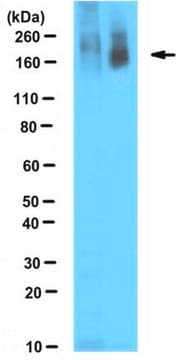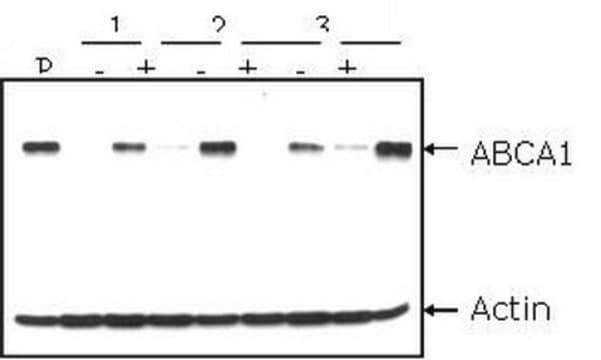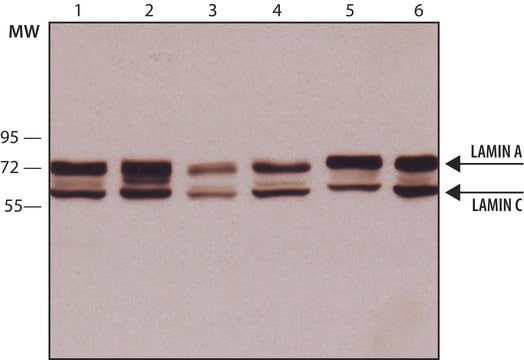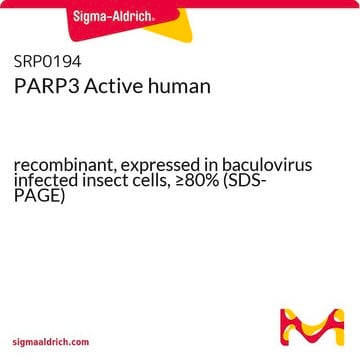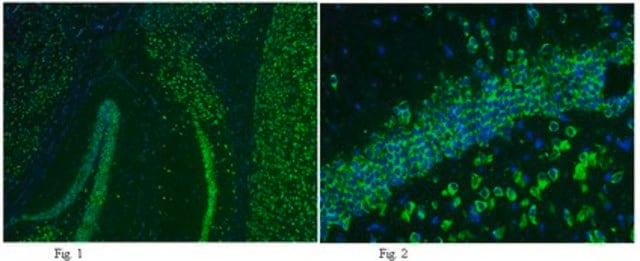MABE1075
Anti-mono- and poly-ADP-ribose binding reagent
from Escherichia coli
Sign Into View Organizational & Contract Pricing
All Photos(3)
About This Item
UNSPSC Code:
12352203
eCl@ss:
32160702
NACRES:
NA.41
Recommended Products
biological source
Escherichia coli
Quality Level
antibody form
purified antibody
antibody product type
primary antibodies
clone
monoclonal
species reactivity
human, mouse
packaging
antibody small pack of 25 μg
technique(s)
dot blot: suitable
western blot: suitable
shipped in
ambient
target post-translational modification
unmodified
Related Categories
General description
Anti-mono and poly ADP-ribose binding reagent is a His-tagged recombinant protein fused to rabbit Fc tag, expressed in and purified from Rosetta (DE3)pLysS strain of E. coli (Cat. No. 70956). It is useful for the affinity detection of both poly-and mono-ADP-ribosylated proteins on membranes in a manner similar to antibody-based Western and dot blot analysis. The rabbit Fc tag allows visualization of the binding with conjugated anti-rabbit secondary antibodies. The Fc tag also allows Anti-ADP-ribose binding reagent to be captured on Protein A resins for affinity pull-down applications.
Specificity
This reagent binds to both mono- and poly-ADP ribosylated proteins.
Application
Anti-mono- and poly-ADP-ribose binding reagent, Cat. No. MABE1075, is a reagent that targets mono- and poly-ADP-Ribosylated proteins and has been tested in Dot Blots and Western Blotting.
Research Category
Epigenetics & Nuclear Function
Epigenetics & Nuclear Function
Western Blotting Analysis: 0.4 µg/mL of a representative lot detected mono- and poly-ADP ribosylated proteins.
Dot Blot Analysis: A representative lot detected mono- and poly-ADP-ribosylated proteins.
Dot Blot Analysis: A representative lot detected mono- and poly-ADP-ribosylated proteins (Courtesy of Lee Kraus, University of Texas Southwestern Medical Center).
Western Blotting Analysis: A representative lot detected mono-and poly-ribosylated proteins. (Courtesy of Lee Kraus, University of Texas Southwestern Medical Center).
Dot Blot Analysis: A representative lot detected mono- and poly-ADP-ribosylated proteins.
Dot Blot Analysis: A representative lot detected mono- and poly-ADP-ribosylated proteins (Courtesy of Lee Kraus, University of Texas Southwestern Medical Center).
Western Blotting Analysis: A representative lot detected mono-and poly-ribosylated proteins. (Courtesy of Lee Kraus, University of Texas Southwestern Medical Center).
Quality
Evaluated by Gel Electrophoresis.
Gel Electrophoresis Analysis: 0.5 µg of this binding reagent was analyzed on GEL Electrophoresis to test for purity.
Gel Electrophoresis Analysis: 0.5 µg of this binding reagent was analyzed on GEL Electrophoresis to test for purity.
Target description
Variable depending on the target proteins and the extent of ADP-ribosylation.
Physical form
Format: Purified
Immobilized Metal Affinity Chromatography (IMAC)
Purified E. coli recombinant monoclonal binding reagent in buffer containing 10 mM Tris pH 7.5, 0.2 M NaCl, 10 mM Imidazole, 1 mM PMSF, 1 mM -Mercaptoethanol without preservatives with 10% glycerol.
Storage and Stability
Stable for 1 year at -80°C from date of receipt. Handling Recommendations: Upon receipt and prior to removing the cap, centrifuge the vial and gently mix the solution. Aliquot into microcentrifuge tubes and store at -80°C. Avoid repeated freeze/thaw cycles, which may damage IgG and affect product performance.
Other Notes
Concentration: Please refer to lot specific datasheet.
Disclaimer
Unless otherwise stated in our catalog or other company documentation accompanying the product(s), our products are intended for research use only and are not to be used for any other purpose, which includes but is not limited to, unauthorized commercial uses, in vitro diagnostic uses, ex vivo or in vivo therapeutic uses or any type of consumption or application to humans or animals.
Not finding the right product?
Try our Product Selector Tool.
Storage Class Code
12 - Non Combustible Liquids
WGK
WGK 2
Flash Point(F)
Not applicable
Flash Point(C)
Not applicable
Certificates of Analysis (COA)
Search for Certificates of Analysis (COA) by entering the products Lot/Batch Number. Lot and Batch Numbers can be found on a product’s label following the words ‘Lot’ or ‘Batch’.
Already Own This Product?
Find documentation for the products that you have recently purchased in the Document Library.
Fen Long et al.
Acta pharmaceutica Sinica. B, 11(5), 1261-1273 (2021-06-08)
Neointimal hyperplasia after vascular injury is a representative complication of restenosis. Endoplasmic reticulum (ER) stress-induced unfolded protein response (UPR) is involved in the pathogenesis of vascular intimal hyperplasia. PARP16, a member of the poly(ADP-ribose) polymerases family, is correlated with the
Yousef M O Alhammad et al.
Journal of virology, 95(3) (2020-11-08)
Severe acute respiratory syndrome coronavirus 2 (SARS-CoV-2) and other SARS-related CoVs encode 3 tandem macrodomains within nonstructural protein 3 (nsp3). The first macrodomain, Mac1, is conserved throughout CoVs and binds to and hydrolyzes mono-ADP-ribose (MAR) from target proteins. Mac1 likely
Bryan A Gibson et al.
Biochemistry, 56(48), 6305-6316 (2017-10-21)
ADP-ribosylation is an enzyme-catalyzed post-translational modification of proteins in which the ADP-ribose (ADPR) moiety of NAD+ is transferred to a specific amino acid in a substrate protein. The biological functions of ADP-ribosylation are numerous and diverse, ranging from normal physiology
Our team of scientists has experience in all areas of research including Life Science, Material Science, Chemical Synthesis, Chromatography, Analytical and many others.
Contact Technical Service